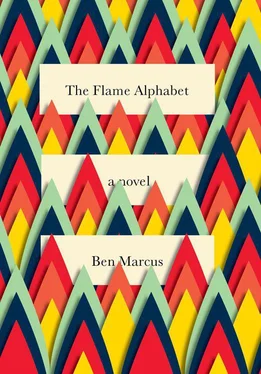After every failure I returned to my desk more certain that scripts were finished. No matter how I ornamented them, in the courtyard the result was the same. Months of this confirmation took place, played out against a range of test subjects. The work that I produced, the letters and codes and then the aggregates and compilations of these, sometimes brought to further order and logic by the Forsythe technicians, was nothing but a weapon.
When I looked from the window at the crowd outside Forsythe, clamoring without a sound to be let in, I felt wildly blank, unresponsive. They were desperate for admission but too cautious to riot, too scared, because it’d be so easy to douse them all with speech, to drive them away with a steady broadcast of the simplest words. In days, maybe weeks, they’d be processed through the system, and they’d sit before something I had written, and all I would have to say to them, after all of the effort they went through, was The quick brown fox jumps over the lazy dog .
What was compelling them to come here in droves like that, to lay themselves open to such rank poison? What on earth, I wondered, was misleading all of these language martyrs into thinking there was something inside of Forsythe that would deliver them?
In his early writings, Thoreau called the alphabet the saddest song. Later in life he would renounce this position and say it produced only dissonant music.
Letters, Montaigne said, are a necessary evil.
But are they? asked Blake, years later. I shall write of the world without them.
I would grow mold on the language, said Pasteur. Except nothing can grow on that cold, dead surface.
Of words Teresa of Avila said, I did not live to erase them all.
They make me sick, said Luther. Yours and yours and yours. Even sometimes my own.
If it can be said, then I am not interested, wrote Schopenhauer.
When told to explain himself, a criminal in Arthur’s court simply pointed at the large embroidered alphabet that hung above the king.
Poets need a new instrument, said Shelley.
If I could take something from the world, said Nietzsche, and take with it even the memory of that thing, so that the world might carry on ever forward with not even the possibility that thing could exist again, it would be the language that sits rotting inside my mouth.
I am a writer, said Picasso. I make my own letters.
Shall I destroy this now, or shall I wait for you to leave the room, said his patron to Kadmos, the reputed inventor of the alphabet.
Kadmos is a fraud, said Wheaton. Said Nestor. Said William James.
Do not read this, warned Plutarch.
Do not read this, warned Cicero.
Do not read this, begged Ovid.
If you value your life.
Bleed a man, and with that vile release spell out his name in the sand, prescribed Hippocrates.
No alphabet but in things, said Williams.
Correction. No alphabet at all .
Sometimes an assembly was called, heralded by a long, dissonant bell.
Here the researchers, scientists, administrators, and the animal handlers who worked their tests in the walled-off southern wing could settle into the surgical theater and view the latest work on display, the experiments with comprehension, the medical tests.
Usually I sat through these assemblies inside a deep facial paralysis. The gatherings had a grueling familiarity to them, and to me they smelled of sport and torture.
Onstage we’d see language spoken through every kind of contraption on the mouth: filters, dampeners, horn-shaped protrusions that must have addressed an acoustical toxicity and turned subjects into ragged, costumed clowns, although by the results witnessed at assembly, they did not soothe the acoustical toxicity, but inflamed it instead.
We observed the testing of a whistle language, delivered through the gashed-open faces of mannequins. Subjects could tolerate, and moderately comprehend, the signals, but when they were forced to whistle, employing a rigorous system of codes, they declined rapidly, showing clear signs of toxicity.
Gesture was tested, mostly on the sick, to see how rapidly they would expire if exposed to unceasing and explicit mime.
Again a mannequin was commanded by remote control to produce the behavior.
We saw every kind of semaphore, like a silent and benighted exercise class conducted by the dead, from the arm-waving style, to be viewed at a great distance, to the single finger-sign languages developed on the middle north wing of the lab.
We watched through perforated masks, distributed upon arrival, lest some of the sickening stuff leak into our senses. Of what we saw, we saw as little of it as we could, which was more than enough for me.
With bloody persistence researchers tested how complex a language of touch could really be. Technicians sat with test subjects and, wearing gloves tipped in abrasives, tapped out rudimentary communications, of distress, of commerce, of desire.
The subjects, reclining in their wheeled hospital beds on the dark, oak stage of the theater, generally endured this work, but only at first. And when they did not endure it, when they made profound protests to the material that was clearly undoing them in every significant way, we were marched from our seats, led from the hall, and corralled as usual back to our offices.
Everything I’d seen so far had prepared me to pay as little notice as I might during these mandatory sessions. And this is right about when a new paradigm was presented to us at assembly, and everything changed.
It was late in my stay in the research wing, when I had already ruled out the efficacy of ancient scripts, had sent reams of alphabets downstairs for toxicity testing, only to have them return in the sleeves reserved for failed research, and I had moved on to the equally unpromising grotesqueries of modern script.
It was a morning around that time when the long bell sounded and we took our seats in the surgery. The lights dimmed. Onto the stage came an old man, his head draped in testicle skin. When he rubbed it and blinked into the lights I saw it was merely his face, beset with a terrible, taffy-like droop. I did not want to reflect what sort of experiments, or what sort of life, had led to possessing a face like that. Behind him wheeled a creaky IV cart.
It was pushed by a child, who was tethered to the thing itself.
I would say that a hush fell at the sight of this man, or more correctly at the uncommon sight of a child, especially one who did not seem to be under guard, but a hush had already fallen. We were steeped in hush, drowning in it. The room was sickeningly quiet. I knew nothing of my colleagues, saw almost nothing of their robed and lab-coated bodies, and could detect little from their impassive, gestureless faces. The lack of speech, the absence of language to build us into full people, had turned us into a kind of emotive cattle. Perhaps a raucous inner life produced shattering notes inside us, but with no extraction tool, no language to pry it free and publicize it, even if it was moronic, one sensed that the whole enterprise of consciousness had suddenly lost its way. Without a way to say it, there was no reason to even think it.
Our faces, without the exercise of speech, had atrophied into slack, piggish masks.
Some of us, I would guess, had not spoken in months, more.
That morning a sheet of glass descended from ropes over the stage, walling off the man and the child.
Once they were enclosed, the man looked up, having apparently heard sounds. He studied the ceiling and then, to what seemed like his own astonishment, he began to speak.
There was nothing to hear. All sounds were sealed from us. On the whole it was an unremarkable spectacle, except for when it came to how this feat of nontoxic language exchange was being achieved.
Читать дальше











